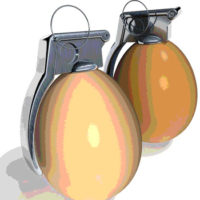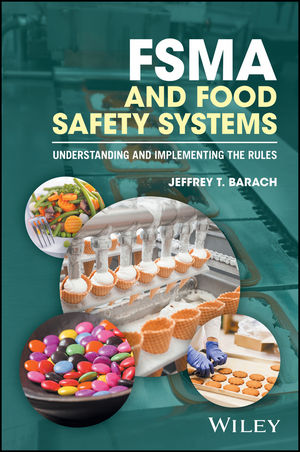The Reality of Intentional Food Contamination Threats

The headline splashed across the front page of The Sun, a British newspaper known for sensationalism, had everything necessary to get the public’s attention. Entitled, “ROBOT WARS – Russia could use robots to poison food for ‘untraceable’ AI assassinations in ‘chilling new Cold War,’” the article included robots, war, Russia, assassinations, a brave computer engineer presented as an expert warning the world, and apocalyptic visions reminiscent of The Matrix.
Obviously, my critique is tongue-in-cheek, but the topic of intentional food tampering is deadly serious. Computer scientist Jeremy Straub said Russia conceivably could use robots for “untraceable” assassinations of state exiles. He added that technology could be used to hack into a meal-ordering system as a way to tamper with the food. Through the wizardry of artificial intelligence (AI), he suggested, ingredients could be switched; perhaps someone with a peanut allergy could be served a burger with peanut residue. The mistake would appear benign, he said.
The article is certainly timely, coming in the wake of the very public nerve agent attack, presumably by Russia, on former Russian agent Sergei Skripal and his daughter Yulia in London. Unfortunately, the suggestions don’t make sense when examined, probably because Straub or the article’s author are not familiar with the food business.
Claim 1: “…future attacks on Russian exiles could be untraceable because of artificial intelligence…” True, future attacks could utilize AI, but such technology is often traceable. A lot of sensational claims have recently been made about AI, but we are a long way from the time when we need to be concerned about machines taking over the world and killing all the humans.
Do the Russians need to use AI for accomplishing subtle assassinations? Not likely. If Russia was responsible, a clear and very public message was being sent. Russia is seldom subtle, and the message would have been meant for Russians in exile. The message: “Betray us and you die.” A possibly accidental poisoning at a fast-food restaurant wouldn’t be nearly as effective.
Claim 2: This next claim is the whopper…or, pardon the pun, actually the Big Mac of all of the article’s claims. Straub notes that McDonald’s uses kiosks where food can be ordered, and then brings up the food allergy idea. Could allergens be used as a weapon? Absolutely. Are bad guys thinking about how to do this? Possibly. It is true that one of the big concerns in food processing is the intentional introduction of an allergen or other toxic material into the food chain. This could be accomplished remotely (via a cyber-attack), but more likely by the actions of a disgruntled employee on the inside (which has happened) or even a would-be terrorist (which almost happened).
To use the McDonald’s kiosk system to conduct an assassination would not make a lot of sense. The Russians would first have to compromise both the kiosk system and the larger McDonald’s cyber network, to which the kiosk system is connected. Luckily, McDonald’s doesn’t want that to happen and spends lots of time and money assuring that it doesn’t.
But let’s assume for argument’s sake that this improbable event has happened. The rogue AI system would then have to instantaneously track the order and cross-reference the McDonald’s payment system, positively linking the order (let’s pretend a Big Mac) to the targeted individual (let’s call him “Ivan”), who is being tracked by the Russians. The Russians also apparently know that Ivan likes Big Macs and has a food allergy, and the compromised system is just waiting for that moment when he orders a burger somewhere in the world. Then somehow, that Big Mac is compromised at some point between the freezer and the front counter by the rapid introduction of some appropriately aberrant ingredient (allergen, toxic material, etc.).
I may be wrong, but I can’t recall ever seeing any surreptitious delivery device for some mysterious but deadly powder or liquid attached to any McDonald’s food handling equipment, just for that one assassination. I think I am pretty safe in claiming that McDonald’s would frown upon any such device showing up in any of their franchise locations.
Sure, if Ivan were allergic to eggs, a Russian spy might get a job at McDonalds and wait until poor Ivan ordered lunch. Then he could stealthily substitute the ingredients from an Egg McMuffin for those of a Big Mac. That might be a bit too subtle for the Russians if they wish to make a public statement by assassination, however. And Ivan, being the smart man he is, might just spot the fried egg before he took a bite. Wouldn’t it be cheaper and a lot more efficient for the Russians to use a knife, a gun, or a rope to eliminate poor Ivan?
So is the food system a likely target for the Russians or, for that matter, the North Koreans or the Iranians? No doubt about it. Those threats are real, but should they be realized, they are most likely to come in a time of war. Are allergens or other toxic materials likely to be used in such attacks? Possibly, but the introduction of toxic materials to the food chain wouldn’t be subtle. If carried out on a large scale, that kind of action would be an act of war and provoke massive retaliation by the U.S. once the source is traced.
Let’s hope that day never comes, but in the meantime, the food chain is best protected by the individuals and corporations who are part of it. Food corporations should never rely on the government as the first line of defense, but always consider themselves the first line. They will be ground zero for any attack, whatever its nature.
Planners of robust food defense programs have to consider all probabilities, leveraging resources in the order from most likely (disgruntled employees) to less likely (terrorist adversaries) to even less likely (nation states). Could the scenario in The Sun article ever actually occur? Well yes, it is not totally out of the realm of possibility, but certainly skirts the edge of impossible.
Rather than worrying about what might happen, food defense managers should invest their time in thinking and planning for what is most probable and likely. Planning has to then go the next step to actually doing security and defenses, rather than just talking about them. Security is an investment, not a cost. There are no guarantees in life, but probability favors those who are prepared.
Robert A. Norton, Ph.D., is chair of the Auburn University Food System Institute’s Food and Water Defense Working Group ( Website: aufsi.auburn.edu/fooddefense). He is a long-time consultant to the U.S. military, federal and state law enforcement agencies, and is editor of Bob Norton’s Food Defense Blog (aufsi.auburn.edu/fooddefense/blog/). He can be reached at nortora@auburn.edu or by phone at 334.844.7562.
DISCLAIMER: Dr. Norton and production of this article were supported by the Alabama Agricultural Experiment Station and the Hatch program of the National Institute of Food and Agriculture, U.S. Department of Agriculture. The article represents the personal opinion of Dr. Norton and does not reflect official policy or statutory related opinion of the Federal Government, National Institute of Food and Agriculture and/or the U.S. Department of Agriculture.
Looking for a reprint of this article?
From high-res PDFs to custom plaques, order your copy today!








